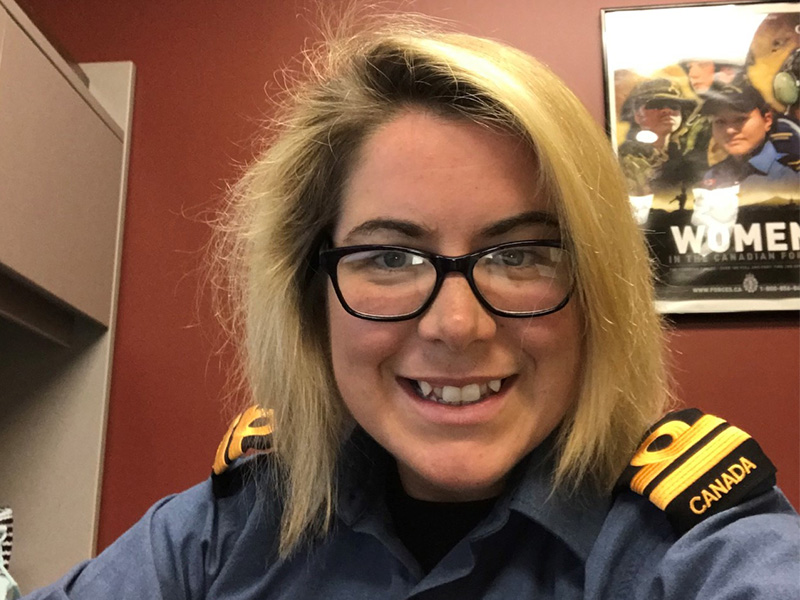Student Profile: Nicole Laurin (Master of Social Work)

Canadian Armed Forces member Nicole Laurin is pursuing a master’s degree in social work and is passionate about effecting positive cultural change in the military.
After 16+ years serving in the Canadian Armed Forces (CAF) as a Naval Warfare Officer, Lieutenant Navy Nicole Laurin is back in class. She brings unique insights into the complexities and inner workings of the military. Now, after switching gears to become a military Social Work Officer, she’s at TMU earning her master’s degree in social work.
As issues of sexual misconduct, harassment, discrimination and gendered social constructs face military organizations, Lt(N) Laurin is researching organizational cultural change. She wants to contribute to research, program development and policy reform within the CAF. She hopes to build on equity, inclusion, and diversity strategies to promote positive change in the armed forces.
What has your experience been like as a mature student at TMU?
Returning to university as a mature student has been a daunting experience, but it has also been enriching. I bring a wealth of life experience and skills to my studies and research, which has been an asset in many ways. But there have also been challenges, including juggling family and work responsibilities, adjusting to the academic expectations of higher education, and feeling out of place among younger peers. The biggest struggle was connecting with other students who shared a similar experience.
I have managed the challenges by using time management and study skills to help balance competing demands. I benefited from flexible course formats, such as online or evening classes. I’ve also found support in abundance during my time at TMU, and by taking a proactive approach, and being determined and dedicated, I have successfully navigated my educational journey, and I am on track to graduate this fall. I hope to continue my educational journey and complete a Ph.D. in social work focusing on organizational change.
What are you exploring in your research project and why did you choose this topic?
Military organizations have been grappling with issues of sexual misconduct, harassment, and discrimination for some time. My research focuses on organizational culture change within the CAF — one of respect and inclusivity, where individuals in the military are held accountable for their actions, and victims are supported and empowered to come forward.
This is an important issue that can significantly impact social work within the military. The field of social work and its scope of practice in the military context is crucial but limited in its role. However, it’s critical to view the topic from the perspective of military social workers, as I believe they’re well positioned to lead cultural change within the armed forces. Through research, military leaders can gain insights into factors contributing to a healthy culture, any barriers that may impede change, as well as strategies, best practices, policies, procedures, and training programs to effect positive cultural change. Research in this area can help create a culture that supports the well-being and success of CAF members while enhancing its overall mission readiness and effectiveness.
“Pursuing my passion for social justice and change is fulfilling work. My hope and goal are to apply my social work knowledge and skills to effect positive organizational and cultural change within the Canadian Armed Forces.”
How are you enjoying the field experience component of your degree program?
My master’s program included a 450-hour field practicum. I have been fortunate enough to complete this placement requirement within my local community, which is Simcoe County. I am working with Simcoe Muskoka Family Connexions, a child welfare agency that covers all of Simcoe Muskoka. Working in child welfare, I have gained front-line experience working with children, youth, and families developing skills in assessment, intervention, and case management. I have also been working with the leadership in the agency to learn and become familiar with the various policies, legislation, and regulations that govern child welfare practice in Ontario, including the agency’s cultural and equity, inclusion and diversity strategy.
My field experience has given me an abundance of learning opportunities navigating working in a multi-disciplinary team and the opportunity to collaborate with a range of professionals, including child protection workers, lawyers, and mental health professionals.
Can you share some advice for graduate students?
Remain inquisitive and engaged in learning. Social work knowledge is constantly evolving, and staying current on the latest research, theories, and practices is essential. Engage in class discussions, attend conferences, and participate in extracurricular activities to deepen your knowledge and expand your network.
Secondly, build strong relationships with faculty and seek out opportunities to connect with others in your program. I was lucky to have an online community with peers in my cohort, which was invaluable in terms of learning, information sharing, and support. Be reflective and self-aware, reflect on your values, biases and assumptions, and daily seek feedback from your peers and supervisors to enhance self-awareness and cultural humility. I have found this to be a full-circle process critical to my growth as a graduate student.
Lastly, I encourage the practice of self-care. Graduate studies can be emotionally taxing and mentally draining, and it’s important to prioritize self-care throughout your program. Self-care is unique to us all, and what works for some might not work for others. Develop a self-care plan incorporating exercise, healthy eating, mindfulness, and other strategies that promote your well-being and resilience. Resist the daily grind and begin to normalize rest, not as a reward for our work, but rest as an entitlement for all human beings.
